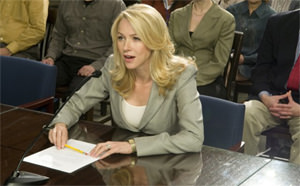‘Fair Game’: Spying in the Suburbs
It’s not quite “Ozzie and Harriet with Security Clearances,” but there is something inescapably unedifying in watching the Wilsons bicker their way through the clichés of marital disaffection in a case that—let’s face it—was of small import in the context of the much larger crimes perpetrated by a pusillanimous power elite.The film is more about the deterioration of suburban decorum than it is about the deterioration of honor and probity in the upper reaches of American government.
Words that make your blood run cold: “… [T]he more we heard Valerie and Joe about the effect this had on their marriage, the more we realized that here was a deeply personal human drama.”
What Doug Liman, the director of “Fair Game,” is really saying is that his movie is not going to be a deeply serious investigation of the national security issues raised by the Valerie Plame-Joe Wilson case of 2001, in which she lost her job as a secret CIA operative and her husband became a hotblooded scold of the Bush administration when it denied information he had uncovered that inconvenienced its run-up to the Iraqi invasion. What his film does instead is turn the incident into a sort of situation-melodrama, in which under pressure, both financial and moral, the Plame-Wilson marriage deteriorates into a series of increasingly hostile exchanges between the couple, with bewildered children failing to understand why Mommy and Daddy are yelling at each other and the upshot being a brief trial separation. The film is more about the deterioration of suburban decorum than it is about the deterioration of honor and probity in the upper reaches of American government.
Here are the slightly boring facts of the matter: Joe, a retired diplomat, is recruited by the administration—with his wife putting in her two-bits in his favor—to investigate rumors that Iraq had attempted to purchase a large quantity of “yellowcake” (i.e. uranium) from Niger. If that was the case, it was a serious indication that Saddam Hussein was, in fact, attempting to fabricate weapons of mass destruction—a hugely important justification for waging war against him. Wilson, however, found no evidence that such a deal had been struck and reported his findings to the Bushies, who nevertheless persisted with their yellowcake fantasies, citing other sources in support of their claim. Wilson then went public with his side of the story, via a New York Times Op-Ed. At that point the government—probably illegally—outed Plame as a spy, which had the significant side effect of endangering the network of secret agents she had been running.
This was unquestionably a shabby incident, the largest import of which was to put human, victimized faces on the administration’s brutal and heedless attempts to manipulate public opinion. It certainly rallied liberal opinion against its operatives—though without any practical effect on the way history eventually played out. One is sympathetic to the film’s attempt to tell this story faithfully and admiring of Naomi Watts’ patient portrayal of a woman whose default setting is discretion and to Sean Penn’s blustery portrait of her noisily obstreperous spouse. But one is also aware that the film’s writers, Jez Butterworth and John-Henry Butterworth, are somewhat trapped by their sources: a pair of books written by the Wilsons. They are unable effectively to penetrate the minds of the government’s shady minions and admit to a good deal of fictionalization about Plame’s CIA activities. At the same time, they are silent about a number of elisions. For example, they don’t even mention Judith Miller, the New York Times reporter whose ambiguous activities in the case significantly affected its outcome and eventually landed her in jail.
In the end, “Fair Game” represents a further trivialization of what finally seems a fairly trivial incident. It’s not quite “Ozzie and Harriet with Security Clearances,” but there is something inescapably unedifying in watching the Wilsons bicker their way through the clichés of marital disaffection in a case that—let’s face it—was of small import in the context of the much larger crimes perpetrated by a pusillanimous power elite. The movie gives away its failures in its concluding sequence, which finds Joe Wilson addressing a college class, reminding the students that eternal vigilance is the price of liberty. It’s a tiresome cliché and not even an entirely appropriate moral for this drama, which is really about minding your back when the ideologues pull out their shivs and start menacing you. It’s supposed to provide the movie with a big, idealistic finish. But it is a forced and fatuous device, an attempt to provide some Big Think to what now seems—at least in this telling—a resolutely minor account of bureaucrats at their typically vicious and largely amoral play.
Your support matters…Independent journalism is under threat and overshadowed by heavily funded mainstream media.
You can help level the playing field. Become a member.
Your tax-deductible contribution keeps us digging beneath the headlines to give you thought-provoking, investigative reporting and analysis that unearths what's really happening- without compromise.
Give today to support our courageous, independent journalists.






You need to be a supporter to comment.
There are currently no responses to this article.
Be the first to respond.